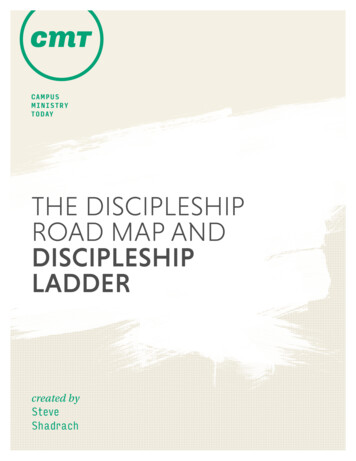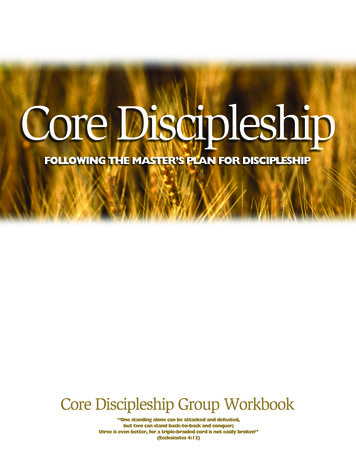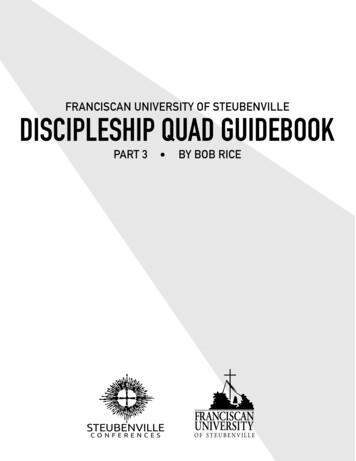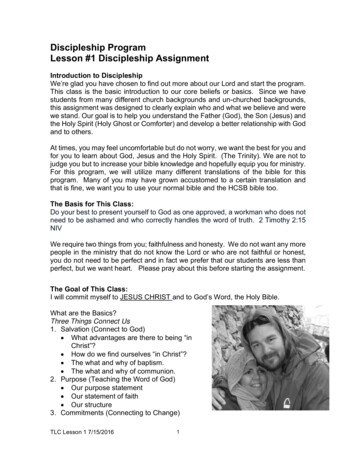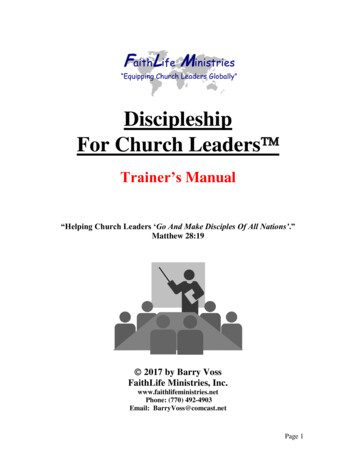![Foundations For Discipleship [The Document].doc](/img/23/foundationsfordiscipleship-thedocument.jpg)
Transcription
Foundations for Discipleship(A Profile for Effective Discipleship Ministry) Dr. Kenneth HammondsLife, Leadership & Discipleship: COACH KenHammonds.com KH@KenHammonds.com 323 753 1366 “Preaching the Good News and Perfecting the Disciples IS the Business of the Church.” I. The Purpose of this Profile, p.1 II. Definitions of Discipleship, p.1 III. The Goals, Aims and Definitions of Discipleship(A Holistic View), p.3 IV. Discipleship in the Gospels: Basic Requirements forJewish Followers of Jesus, p.4 V. The Crucified and Resurrected Lord Extends HisDiscipleship Model for the Church(A New People Created for a New and Living Way), p.5 VI. Discipleship in the Book of Acts: MoreRequirements, New Terms for a New People, p.6 VII. Discipleship in Pauline Epistles: Expanding theDiscipleship Design for the Gentiles, p.7 VIII. Discipleship and Mentoring, p.10 IX. A Five-Fold Perfecting Discipleship Model(A Holistic Model), p.15 X. A Life Curriculum for Christian Discipleship(A Holistic Model), p.17 XI. Expansion and Integration of the DiscipleshipOrganizational Structure, p.18 XII. Resultant Ideas, Themes. Logos, and GraphicModels, p.19I. The Purpose of this ProfileThe purpose of this document is to provide the biblical and philosophical thinking for a Holistic Viewof discipleship ministry and practice called, The Perfecting Discipleship Model. It is NOT allinclusive (this is already too long) but it does provide the Framework for discussion, teaching, andleadership development of the Church-wide Discipleship Ministry Model presented here.This document has helped me to crystallize my thoughts and ideas and provides opportunity to think,write, plan and embrace discipleship concepts as applied to our modern day situation and WestAngeles Church. This document is NOT a critique or analysis of the past or present wonderfulprograms of the West Angeles Church Discipleship Department or its leaders. It is just my thinking“out loud” at the keyboard about discipleship from a Holistic perspective.Herein are some seminal thoughts for meditation and action. This Profile is at once scriptural,didactic, reflective and action-based. Most of the Scripture investigations are not new, just remindersof our task and Mission. There are some few hints at some general processes and ideas to beconsidered, but there is no full fleshing out of the implementation of these concepts since that is notthe primary purpose of this Profile. That kind of activity can only be done with discussions andinteraction with leadership and with the people to whom we minister.It is hoped that this profile will offer some motivation concerning the importance of discipleship asthe believer is being perfected in his or her walk for Christ and I trust it will act as a catalyst for newideas for growing believers in this modern age. Part of this Profile may also be utilized as a basicintroduction to discipleship principles.II. Definitions of DiscipleshipThe word ‘disciple’ is the English form of the Latin word discipulus, which is derived from discere,which means to learn. From this term we expand the meaning to learner, pupil, [follower], scholar.These are the same basic meanings of the New Testament Greek word, mathētēs. [New Testamentscholar, Craig Keener, adds to the description of disciple as one who is memorizing and livingaccording to the teachings of the Master.]
2It indeed is one who is disciplined in the way of his leader or lord. Jesus adds three more key elementsto this basic definition. They are: 1. Total Commitment, 2. Obedience to His Lordship, and 3.Service to the “little people.” So, for the Church of Jesus Christ, discipleship is the process by whichwe become more capable, committed and competent followers of our Lord Jesus Christ.It is through the spiritual disciplines like daily devotions, fasting, prayer, meditation, churchattendance and the reading of the Word of God that we can live the Word in our daily lives. As wealso seek to grow through our local churches and the wider fellowship of the believers, we will bewell on the way to becoming effective disciples of Jesus Christ. (The above is quoted from an articlefrom Bishop J. W. Macklin, The Disciple and the Church.)Bishop Macklin was the Chief Production Head for the COGIC Centennial Discipleship Bible. I was fortunateenough to be a part of the production of this Discipleship Bible project as its Chief Editor.Defining Disciple (KH)A disciple is one who is disciplined in living out the lifestyle and teachings of his orher Master Teacher and Lord.Some MODERN DAY WORDS for the older word “disciple” would be – fan, supporter, believer,groupie, advocate, devotee, enthusiast and adherent. Most of these words will fit depending upon thecontext. However, I like the words Supporter, Enthusiast, Believer, Advocate and Adherent. There areeven contexts in which the word “groupie” is not necessarily negative or too fanatical. (A Jesusgroupie – makes me think of the 1960’s and the Jesus hippies movement. – Sorry for the digression.)THREE CORE DEFINITIONS:What a disciple does and believes. A Disciple – Embraces the teaching and lifestyle of his or her teacher. A Disciple – Assists in Spreading the teachings of his or her teacher. A Disciple – Is an Active Adherent of his or her teacher.I like especially the word “adherent” for it seems to encompass a variety of related words. Seven arebelow.1.2.3.4.5.6.7.Seven Meanings of the word, adherent, for a description of a discipleSupporter: Worker and Christian steward of God’s resourcesBeliever: A Pisteuō Believer (Pisteuō – Greek meaning, one with a passionate commitment toa person, cause or idea)Advocate, Proponent - Makes Other Disciples: Is vocal in sharing the teachings (GoodNews). The disciple tells others about his or her teacher and the teacher’s wisdom, knowledgeand life. The disciple also shares the personal effects of these teachings upon his or her life.Devotee: Is fully loyal to the mission of the teacher.Enthusiast: Gladly shares in the joy of the teacher’s teachings.Member of a Community: Enjoys the camaraderie of assembly with other disciples and assuch, the disciple wants to multiply the number of the community’s members.Living Example, Living Proof of the Teacher’s Teachings: This shows that the teachings ofthe Teacher do work and are indeed true. The disciple’s life change and personal improvementare Proof Positive of the effects of the teacher’s power to affect lives.All of these descriptions above apply to the disciples of the Lord Jesus Christ
3DISCIPLESHIP PHILOSOPHIES AND IDEASToday, the phrase most in fashion is “Spiritual Formation.”Traditional Ideas Spiritual Growth through Personal Evangelism Spiritual Growth through Personal Bible Study Spiritual Growth through Personal Devotional Studies Spiritual Growth through Personal Mentorship Spiritual Growth through Personal Spiritual Maturity (personal piety)Current Concepts – Psychological and Social Impact Emphases Spiritual Growth through a personal therapeutic faith community using Christ-likeness, a biblicalpneuma-psychology and a therapeutic process for development. (Peter Holmes) Resurrection-Discipleship-Justice-Discipleship means also declaring and working for justice.(Thorward Lorenzen) The Politics of Discipleship and Discipleship in Politics – Discipleship also means participating inpolitics and political discussion. (Jurgen Moltmann)III. The Goals, Aims and Definitions of Discipleship (A Holistic View)Simply Defining Christian Discipleship Perfecting Believers Perfecting Believers for Service Perfecting Disciplined Believers Serving Christ More Effectively both in the Church and in theWorld as God’s Representatives.The Goal of Christian DisciplesThe goal of discipleship is to foster and provide an environment for the complete maturity (maturityin every way) of the believer in Christ. It aims to make the individual a better follower, learner andstudent of Jesus Christ.More simply, discipleship’s goal is to Perfect Disciples (Believers)How to Perfect Disciples – Program Structural Elements One way the perfecting of disciples will be accomplished is by assisting disciples to find theirgifts to serve the Church and the world. (Self-assessments, Other Self-growth Instruments) Another way to perfect disciples is by providing an atmosphere where their maturity can beenhanced through fellowship and both formal and informal educational experiences.(Classroom, fellowships, teleclasses, teleconference fellowships, webinars, and all the availableInternet social media.) Encouraging personal discipleship growth by offering resources for their development in apractical way. Believers in this instructive experiential milieu will be able to grow in Christ andserve the community when they are NOT in classes or even a church environment.(Recommended books, readings, CDs, DVDs, other media formats)Definition of HolisticHolistic - from the Greek word, holos, meaning all, entire, the total, complete. It is the whole,complete integration of all aspects of life and the interdependence of each area of life contributingto (or distracting from) the full growth of the individual.
4Holistic Discipleship, An Attempted DefinitionA Holistic Discipleship – An all-inclusive human development growth of spiritual, personal, socialand relational disciplines that assist the believer to serve Christ more effectively both in the Churchand in the world as God’s representatives on Earth.This holistic view of Christian development sees Christian formation as more than only “spiritual”maturity and growth. It also views discipleship formation as the all-pervasive influence of the HolySpirit empowering the believer at every point of the human condition and concern.A More Formal Definition (perhaps too formal)Holistic or Gestalt Discipleship is an existential and experiential formation of the Christian disciplethat focuses upon the individual's experience and relationship with God in daily walk within theenvironmental and social contexts in which the disciple of Christ lives and the daily relationshipsencountered. It is in this “worldly” environment the Christian disciple must practice self-regulationthrough spiritual life adjustments in EVERY AREA of life (holistic living) because he or she isindeed a Disciplined One, shaped, transformed and being transformed by the Spirit of God for dailyservice to Christ. It is the continual transformation (progressive sanctification) of the disciple into theimage of Christ for service to the Church and world (Galatians 4:19, Romans. 8:29, Colossians 3:10).Holistic ScripturesJesus’ Growth was Holistic – Not Just “Spiritual”Luke 2:52 - And Jesus increased in wisdom and stature, and in favour with God and man. Wisdom Growth in Knowledge and Experience Stature Physical Maturity Favour with God Spiritual Maturity Favour with Man Social Maturity3 John, Verse 2 (NKJV)Beloved, I pray that you may prosper in all things and be in health, just as your soul prospers.James 1:4 (New International Version, NIV) Perseverance must finish its work so that you may bemature and complete, not lacking anything.Ephesians 4:15 (NIV) Instead, speaking the truth in love, we will in all things grow up into him whois the Head, that is, Christ. (More on the Pauline view of discipleship in Section VII.)IV. Discipleship in the Gospels: Basic Requirements for Jewish Followers of JesusDuring Jesus’ days on Earth the focus was upon the twelve disciples. Their occupation was literally“following” Jesus – being a disciple. They had left “all” to follow Him. They were also called“apostles” (personally chosen and commissioned ambassadors). Then there was also a multitude ofdisciples (Luke 19:37).Today, most of us will not be “professional followers,” and certainly not directly chosen apostles,however, even though we have other occupations and jobs, yet nonetheless, we too are His disciples.Jesus’ Requirements for DiscipleshipNote: These analyses of the various contexts of the word “disciple” in the Gospels and Acts do not include theterm “follower” or the verb “following.” These terms will indeed greatly expand the details for Jesus’
5requirements for a disciple of Jesus Christ. But, for our purposes this beginning scriptural inquiry will layadequate foundation for our delineation of the Discipleship Model presented here.Jesus begins to require full commitment from certain of His followers to distinguish his “true”disciples from the crowd of “followers.” Note: Judas is also called a “disciple” (John 12:4).The Requirements Mentioned in Conjunction with the Word “Disciple” are:Requirement #1: Baptism – John 4:1-2Requirement #2: Share in His Sufferings – John 6:66. Some “disciples” left. (This is a fore view ofthe establishment of the Christian Death-Resurrection Celebration – The Lord’s Supper,Communion.)Requirement #3: The “real” disciples will live by (continue in) His words – John 8:31.Requirement #4: Disciples are now also believers – John 8:31.Requirement #5: Love for one another – John 13:35.Requirement #6: Bear Fruit – John 15:8.Requirement #7: “Ye must be born again.” (John 3:7) Jesus announces this born again spirituallyrequirement to a former disciple and teacher of the Pharisees who is now a probing thinker and“inquisitive” disciple of Jesus. (See John 3:7; 7:50; 19:39.)There are Three Groups of Jesus Followers in the Gospels The Crowd of Non-disciples The Crowd of Disciples, Unsure of their Full Commitment or Belief The Group of Committed Disciples who were Fully BelieversThese groups still exist in the visible church today: 1) the crowd, 2) the crowd of uncommitted,unsure disciples, and then 3) the committed disciples – the true believers.There are three groups of “disciples” mentioned in the Gospels: the Disciples of John, the Disciples ofthe Pharisees and the Disciples of Jesus.V. The Crucified and Resurrected Lord Extends His Discipleship Model for the Church(A New People Created for a New and Living Way)Matthew 28:18-2018And Jesus came and spake unto them, saying, All power is given unto me in heaven and in earth. 19Go ye therefore, and teach all nations, baptizing them in the name of the Father, and of the Son, andof the Holy Ghost: 20 Teaching them to observe all things whatsoever I have commanded you: and, lo,I am with you alway, even unto the end of the world. Amen.It is nearly common Bible knowledge now that the word “teach” in verse 18 is the Greek wordmathēteuō which means to make a disciple, to enroll as a student or scholar; to teach, to instruct.This is the key passage for the Mission of the Church: To disciple (teach, train) and enroll others intorelationship with the Jesus Christ. [mathēteuō pronounced – mah-thay-TWO-oh]Hebrews 10:20 (KJV)By a new and living way, which he hath consecrated for us, through the veil, that is to say, his flesh;
6The Resurrected Lord has Full Authority over the Church – His Body of Believers.In the Matthew 28 passage He reminds us of one prior requirement (baptism), but places it into adifferent Triune godhead context and now extends the baptism requirement to all those who would beHis disciples.Requirement #8: Go – (Another way to say evangelize – preach the Gospel for repentance, conversionand inner change)Requirement # 9: Another requirement upon the believer (disciple) is to now be a discipler (teacher)of another. (A mentor of spiritual, personal, social and relational life.)Thus, Jesus’ two new requirements are evangelizing and discipling – that is, teaching followers theprinciples regarding how to live out His teachings and necessary way of life. These elements ofenlisting other learners (#8) and growing (teaching, discipling) those who are apart of this newcommunity (#9) are now given as two primary tasks of His Church (Greek – ekklēsia His called outassembly of followers, believers). This ekklēsia (this Church) is a totally new group comprised ofJews and Gentiles who are to be His representatives on Earth.This is a fundamental change. And it is the only way that Christ will both individually grow Hisfollowers into His image and then expand the reach and scope of His teachings globally. Since Hewill not be present physically, Jesus wants His true followers to be His representatives on Earth.VI. Discipleship in the Book of Acts: More Requirements, New Terms for a New PeopleThis new group – the Church of Jesus Christ, is now being formed rapidly in Acts. And the Book ofActs gives us some further insights into Jesus’ Disciples.Requirement # 10: The disciples of Christ are now clearly those who believe in his death, burial, andresurrection (Acts 2:32; 6:7 ).Requirement # 11: They are supposed to multiply – rapidly. The disciples start out at about 120, butmultiply very rapidly Acts 1:15, 6:1, 7 and includes the common populous and those with advancedlearning and positions.Requirement # 12: They are to be Givers, Supporters (Stewardship). The disciples are givers,financial supporters according to their ability to share. (Supporting the Christians in need in Judea,Acts 11:29.)Requirement # 13: They are to be filled with the Holy Spirit. A clear joy for this dispensation. In theold dispensation only a few chosen people of God were filled with the Spirit. In this new dispensationall believers have access to this gift and endowment (Acts 2:33; 13:52). Indeed, it is the power fortheir desire to serve.Requirement # 14: They are expected to be obedient (Acts 6:7).Requirement # 15: They are to be ONLY followers of Christ and not any man, not even one in theChurch. Acts 20:30 – Paul warns that there will come some from within the ranks of the Church whowill “draw away the disciples after themselves” NKJVNRSV (New Revised Standard Version)- Some even from your own group will come distorting thetruth in order to entice the disciples to follow them.
7The point here is that the Scriptures never refer to a believer in Christ as a “disciple” of Paul orPeter. The term disciple is ONLY used of those who are to follow as committed disciples of JesusChrist only. It is interesting that the term disciples of, is also used for the location of residence. Like,the disciples of Caesarea, that is, the disciples [of Jesus Christ] who live in Caesarea. See also 1Corinthians 1:12.The Last Occurrence of the Word “Disciple”The last reference to “disciple” in the Bible (NT) is a rich one. Acts 21:16 refers to Mnason ofCyprus, as “an old disciple.” The Greek word here, “old” referring to Mnason, is not so much anemphasis on his age as to him being one of the older disciples “in time,” an ORIGINAL DISCIPLE.Indeed, Mnason was an O.G., one of the original disciples of Jesus Christ. This is about A.D. 57, only24 years after the earthly ministry of Jesus. So, Mnason may not have been really that old, but the factthat he is one of the “Original” followers of Jesus makes this man noteworthy. Many had fallen away,but Mnason remains a committed disciple of Jesus Christ through these two decades.New Names for the New DisciplesIn the Book of Acts the original term “disciple” is gradually being replaced by other words, moredescriptive the characteristics of a true disciple, thus eliminating the confusion that was evident in theGospels. In the Gospels during the ministry of Jesus Christ several words were used: Apostles,disciples, crowds, disciples indeed, and followers – all these terms became confusing as to who werethe “real” followers of Jesus and His Lordship. So, in the Book of Acts other terms began to takeprominence and thus clarify what we mean in the Christian Church by the using the word, “disciple.”Distinguishing Characteristics of the Disciples from their New Names1. Disciples – Disciplined, committed followers2. Christians – Those who belong to, are followers, adherents, and supporters of Christ3. Saints – Those living a pure life before God and man. A life of holiness unto the Lord.4. Believers – Those who have a passionate commitment of their entire self to the man, the messageand the ministry of Jesus Christ. (Greek word pisteuō – To commit oneself with passion. To have apassionate commitment to a person, system or idea.)5. Those of the Way – Those who follow the path set before them by their Master Teacher and Lord.6. Brothers, Sisters – Those who are a part of a new family and relationship, a new fellowship – theFamily of GodVII. Discipleship in Pauline Epistles: Expanding the Discipleship Design for theGentilesPaul expands the Christian Discipleship Design for the task of the Church as being to PERFECTBELIEVERS. Paul transitions from merely the broader word “make disciples” with its multiplechoices of followers to the stronger and clearer concepts with content, and that is to perfect andequip. To sum this up, in the Pauline view the task of discipleship is to perfect believers internallyand to equip them so they might serve externally.Paul makes a wonderful application from a statement of Jesus Christ in the Gospels. Paul builds hisview of discipleship centering it around the basic concept of PERFECTING and uses various NTwords indicating equipping, edifying (growing), completing, making whole, repairing, etc. Jesus’statement in the Gospel of Luke was Paul’s catalyst for developing his view. It is even possible thatPaul heard of this saying of Jesus as Luke was doing his investigations to write his Gospel. Paul nowuses it as the springboard for expanding the concept of a Christian disciple to the Gentile world.
8In Luke 6:40 Jesus says,KJV – The disciple is not above his master: but every one that is perfect shall be as his master.NKJV – A disciple is not above his teacher, but everyone who is perfectly trained will be like histeacher.The word for “perfect” in this verse is a verb with very powerful and rich meanings. Katartizō meansto complete thoroughly, to outfit, thoroughly equip or even to repair that which was broken. Therichest definition of the katartizō is to make one what he ought to be. That indeed is the task of theChurch (people of the Church, the disciples of the Church, you as a disciple) TO PERFECT,that is — to empower individuals to be what that ought to be and what they can be.Paul picks up on the statement of Jesus and makes perfecting disciples (believers) the task of theChurch. He sums it up this primary task with the two final requirements for discipleship’s task.Disciples are to be Edified and Equipped.We alliteratively say it is the task of the Church to: Evangelize, Edify, and EquipEvangelize the World – Preach and teach the Gospel (the Good News about God and what He hasdone through His Son, Jesus Christ) to every group and class of people. Matthew 28:19 – all nations Greek, ethnē nation, race, tribe, nation, people group (non-Jewish group of people). That is to say,the entire human family.Requirement # 16: Edify (build up, grow) To mature believers in Christ. To preach and teach theWord (the Bible) to believers (2 Timothy 4:2).Requirement # 17: Equip (prepare, fully equip) To make ready and organize believers for effectiveand valuable service to Christ both in the Church and in the world as God’s representatives (2Timothy 3:17; 1 Thessalonians. 3:10).2 Timothy 3:17 (NKJV)That the man of God may be complete, thoroughly equipped for every good work.The Greek word for “thoroughly equipped” is exartizō. It means to complete, finish, to bethoroughly prepared or thoroughly furnished or equipped. To be furnished or provided witheverything one needs.1 Thessalonians 3:10 (KJV)Night and day praying exceedingly that we might see your face, and might perfect (katartizō –thoroughly equip) that which is lacking in your faith.Notice the West Angeles Church Mission Statement (1996) and this three-fold task of the Church:
9THE WEST ANGELES C.O.G.I.C.MISSION STATEMENT West Angeles Church of God in Christ seeks to bea Biblical ministry of Excellence designed toencourage life transformation through ourthreefold purpose: to Evangelize, Edify, andEquip the whole person to serve the communityand reach the world for Jesus Christ.We strive to be compassionate in our love,excellent in our service, holy in our living, andpassionate and reverent in our worship.Also, note the West Angeles Church self-defining pledge to “grow” believers is stated throughout theentire West Angeles Church Philosophy of Ministry Statement produced in 1995. This two pageStatement provided the philosophical exposition and commitment for our ministry as a church. SevenKey Statements are listed below.THE WEST ANGELES C.O.G.I.C.PHILOSOPHY OF MINISTRY STATEMENT Seven Key Growth Statements1. Called by God to foster the growth of believers2. We meet the needs of the whole person – spirit, soul, and body and thewhole community – political, social, spiritual and moral.3. We fellowship together to develop our spiritual gifts, to encourage eachother through prayer and deed to become better disciples of Christ.4. Two of the seven words that best describe our ministry are “growth”and “wholeness.”5. The mission of West Angeles Church is to the total person, to educateand develop the whole person.6. The mission of the West Angeles Church is to enhance the growth ofindividuals (church, as well as unchurched).7. We prayerfully join Jesus Christ in His goal to make people whole [KHNote: disciple people] by serving the whole person: spirit, soul and body.
10Paul’s best exposition of this concept is in Ephesians 4:7-16 (NIV)7But to each one of us grace has been given as Christ apportioned it. 8 This is why it says: “When heascended on high, he led captives in his train and gave gifts to men.”9(What does “he ascended” mean except that he also descended to the lower, earthly regions? 10 Hewho descended is the very one who ascended higher than all the heavens, in order to fill the wholeuniverse.) 11 It was he who gave some to be apostles, some to be prophets, some to be evangelists, andsome to be pastors and teachers, 12 to prepare God’s people for works of service, so that the bodyof Christ may be built up 13 until we all reach unity in the faith and in the knowledge of the Son ofGod and become mature, attaining to the whole measure of the fullness of Christ.14Then we will no longer be infants, tossed back and forth by the waves, and blown here and thereby every wind of teaching and by the cunning and craftiness of men in their deceitful scheming. 15Instead, speaking the truth in love, we will in all things grow up into him who is the Head, that is,Christ. 16 From him the whole body, joined and held together by every supporting ligament, growsand builds itself up in love, as each part does its work.Ephesians 4:12 (KJV)For the perfecting of the saints, for the work of the ministry, for the edifying of the body of Christ:KJV – For the perfecting of the saints (the goal of discipleship)KJV – For the work of the ministry (equip for service)KJV – For the edifying of the body of Christ (edify – build up, mature)VIII. Discipleship and MentoringThere are various types of mentorship and communication methods – Paul used small groups, largergroups and one-on-one individualized types of mentoring. He utilized the speaking and writingcommunication methods. This is a model for today: to use the modern-day communication methodsavailable to us. (See again paragraph above, How to Perfect Disciples, page 3.)The Pauline Mentoring Model Types Groups (small and larger) One-to-One (individualized)The Pauline Mentoring Communication Methods Media Communication (letters, personal speaking, sending representatives)Paul mentors (a modern word) believers in order to prepare disciples (God’s people) for leadershipand service for Christ to the Church and to the world.Mentor – A Word HistoryBy the way, the word “mentor” was available for Paul in his times. The original Mentor in classical Greekliterature was in the epic, Odyssey by Homer (c. 700 B.C.). He was the trusted friend of Odysseus left incharge of the household and son during Odysseus's absence. The word probably means, advisor although inthmodern usage around the 18 century it was elevated to mean wise and trusted counselor or teacher. Theword root meaning is “to think.”Paul, The DisciplerHowever, Paul is not merely a “mentor,” teacher, or counselor, he is a DISCIPLER – a maker,perfecter, enabler, equipper, designer, and a private instructor (tutor). He prepares them for leadershipand service to the Kingdom of God, service to the world, and for the expansion of the Kingdom ofGod in the world.In the search for the right word to call this relationship and the person leading the relationship theword search is broad as you can see from the above attempts in word choices. They all are somewhat
11descriptive and can be used in various senses. But, we gain good insight into this “relationship”when we see how Paul describes himself in the Matthew 28:19 sense (as discipler), but using his owndistinct expansion of the duties of a “discipler.” Indeed, he is, and he was seen as a “discipler” as hebuilt churches and taught converts and expanded the Kingdom of God by adding, training andinfluencing people. Acts 14:21 Luke even uses Jesus’ word mathēteuō [to disciple, to make adisciple, to instruct] for Paul’s mission work in the first missionary journey in the town of Derbe.Acts 14:21 (KJV)And when they had preached the gospel to that city, and had taught many, they returned again toLystra, and to Iconium, and Antioch,Acts 14:21 (NKJV)And when they had preached the gospel to that city and made many disciples, they returned toLystra, Iconium, and Antioch,Biblical Historical Note: Luke uses the same word during Paul’s First Missionary Journey (A.D. 48) thatJesus says in Matthew 28:19 [mathēteuō], but it is probably well before the writing of Matthew in aroundA.D. 70, about 12 years later. So Jesus’ command to “make disciples” is being taken literally by Hisfollowers and the apostle Paul. And the command is passed on through the o
Foundations for Discipleship (A Profile for Effective Discipleship Ministry) Dr. Kenneth Hammonds Life, Leadership & Discipleship: COACH KenHammonds.com KH@KenHammonds.com 323 753 1366 “Preaching the Good News and

